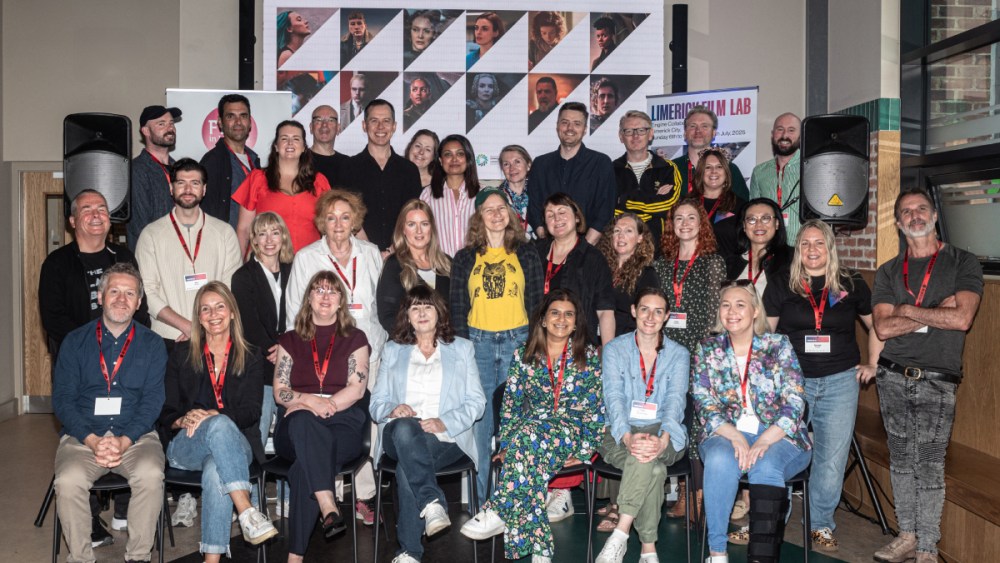EDINBURGH — Ireland’s Minister for Culture, Communications and Sport Patrick O’Donovan is set to open Tuesday’s Edinburgh Film Festival Networking Brunch as the Limerick Film Lab presents its first slate of co-production projects, backed by Enterprise Ireland, Screen Scotland and Film in Limerick.
The initiative – launched this summer by Film in Limerick (Innovate Limerick) with support from Screen Ireland, Screen Scotland, Picture NL and the Limerick and Clare Education and Training Board – gathered 18 producers from Ireland, Scotland and Canada in July for a week of intensive training, collaboration and creative exchange.
Now, a batch of the Scottish and Irish projects — spanning punk-era road trips, folklore horror, near-future satire and psychological drama — will be pitched Tuesday Aug. 19 at the Edinburgh International Film Festival (EIFF) to secure co-production, financing and distribution partners.
“This event marks a pivotal moment in strengthening Irish-Scottish collaboration within the screen sector,” said Emma Farrell at Enterprise Ireland. “By spotlighting the Limerick Film Lab as a dynamic incubator for international co-production talent, we’re showcasing Ireland’s deep commitment to nurturing the next generation of global storytellers. Enterprise Ireland is proud to play a central role in connecting international stakeholders with Ireland’s vibrant creative industries.”
Paul C. Ryan, regional film manager at Film in Limerick, added: “Following the success of last month’s inaugural Limerick Film Lab, we’re proud to see our Irish and Scottish producers come together once again to present their projects at the Edinburgh International Film Festival. The Lab has already sparked exciting new connections and EIFF provides the perfect platform to build on that momentum.”
The drive to strengthen ties not only between nations but also led by regions such as Limerick is seen as key to industry growth and a diversity of voices. Ireland’s production has long clustered around Dublin and Wicklow; Scotland’s around Glasgow and Edinburgh. Yet, as seen in Spain, where Basque, Catalan, Madrid and Andalusian sectors all see growth, regional hubs can expand the whole, generating IP, co-production and shared expertise, careers and, crucially, a rich culture.
What Variety has learned so far about the slate:
No Sleep ‘till Belfast (Ronan Cassidy, Ireland)
A teenage punk and his friend steal a car to reach a Clash gig in Belfast, navigating fractured family ties and the violence of 1980s Northern Ireland. Written by Greg Burrowes, directed by Jamie Delaney, produced by Ronan Cassidy at Carbonated Comet Productions, the project taps punk’s rebellious spirit for a bittersweet road movie.
Painting Saddam (Anna Mannion, Ireland)
Based on true events, Northern Irish painters hired to decorate Saddam Hussein’s palace become hostages when Iraq invades Kuwait. Written by Colin Bateman and produced by Anna Mannion at Tri-Moon Films, the historical thriller is said to mix dark comedy and political peril.
Bedsitterland (Pius McGrath, Ireland)
A young woman moves to the city only to find paranoia and menace inside a crumbling boarding house. Written and directed by Nick Kelly, the project combines fish-out-of-water vibes and psychological thriller elements. A Berlinale Co-Production Market title, backed by Screen Ireland, it’s produced by Honest Arts, well known for their work in theatre.
The Crier (Richard Lynch, Ireland)
A Traveller girl in 1950s Ireland hunts for her missing sister, confronting banshees, buried curses and a town in denial. Written by Richard Lynch and produced by Stephen Hall at Dark Day Pictures, the high-end horror has Screen Ireland support and positions itself squarely in the international genre space.
The Singularity (Jack Hickey, Ireland)
A blend of science fiction and horror, it follows Caitlin as she searches for her missing father, uncovering a cult in rural Ireland devoted to a godlike AI. Written and directed by Jack Hickey and produced by Lara Hickey for Copper Alley Productions, the film is pitched as a grounded, existential story of grief, progress and the destructive urge to live forever. Developed with Screen Ireland support, it marks Hickey’s feature debut.
Authenticity (Zam Salim, Scotland)
In a near-future Scotland where tourists “Airbnb” human bodies, one worker dreams of escape. Written and produced by Zam Salim (“Up There”) at Incidental Pictures with Early Day Films (“Bait”), the dark comedy has Screen Scotland support. Salim frames it as a sharp satire on class, race and the gig economy.
Miracle Season (Lena Vurma, Scotland)
A private investigator hunts for a missing teenager in a remote coastal town where myths of witches and water spirits still rule. Produced by Lena Vurma at Skye Films, the mystery blends folklore and procedural tension against a Scottish seascape.
The Honey Farm (Rakasree Basu, Scotland)
A young woman fleeing her Catholic upbringing is captivated by a once-celebrated poet at an isolated artists’ retreat. Produced by Rakasree Basu at Momentum Films, the project explores mentorship, seduction and the risks of artistic obsession in a chamber-drama format with strong international festival potential.
Riptide (Ciara Barry, Scotland)
Tara, a former dancer, returns home to care for her brother and finds an unexpected connection teaching a bankrupt divorcé how to swim. Produced by Ciara Barry of Glasgow based barrycrear, the film uses water as metaphor for healing in a tender drama about resilience and unlikely friendship.
Gift From God (Catriona McInnes, Scotland)
A troubled musician abducts a girl she believes is her spirit child, fleeing to Romania’s mountains where grief and myth converge. Written and directed by Catriona McInnes, produced by Laura McBride and John McKay at Compact Pictures. Developed via Screen Scotland’s BellRock and LIM, the project builds on McInnes’ work in shorts where she has had Venice and BAFTA nominations.
Committed (Philip Wright, Scotland)
Jay, a gay man in his thirties, is sectioned after a bipolar episode and refuses to accept his diagnosis. Written by Philip Wright, produced by Reece Cargan at Bombito, it draws from lived experience. Developed with Screen Scotland and the BFI-backed Funny Features Lab, it is positioned as a darkly comic, authentic take on mental health.
